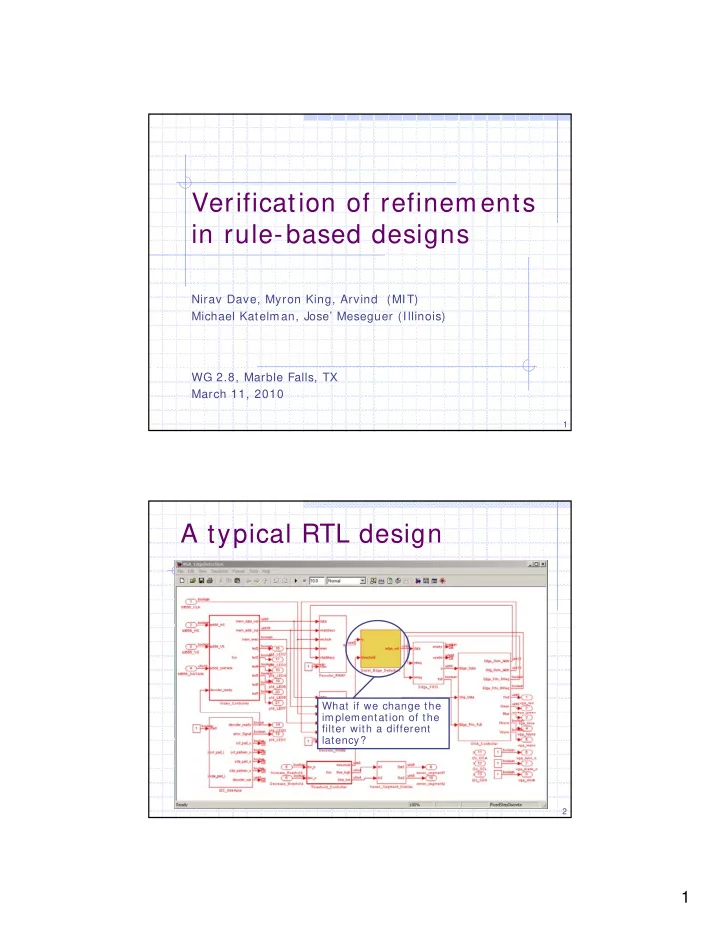

Verification of refinements in rule-based designs Nirav Dave, Myron King, Arvind (MIT) Michael Katelman, Jose’ Meseguer (Illinois) WG 2.8, Marble Falls, TX March 11, 2010 1 A typical RTL design What if we change the implementation of the filter with a different latency? 2 1
Problem in refinement The correctness of thi bl this block depends on k d d the latency of the rest of the system 3 Latency-Insensitive design img rdResp data Memory Edger g 1 1 Detector rdReq RGB Video RdReq Merge wrReq VGA Controller Generator Image Controller rdReq rdResp rdResp (img data) Memory Wrap peripherals 2 with handshake interface for reusability Such latency-insensitive designs are much more amenable to modular refinement 4 2
Refinements inside a block 5 Limitations of FSM-equivalence preserving refinements y i = f1(x i ; r1 i ); r1 r1 r2 r2 r1 0 = 0; r1 i+ 1 = y i ; 1 0 1 z i = f2(y i ; r2 i ); r2 0 = 0; r2 i+ 1 = z i ; f1 f2 x y z Produces the same z shifted by one clock r1 r2 The two FSMs are not f1 f2 equal y z x y’ 6 3
A rule-based description r1 r1 r2 r2 register r1 = 0, r2 = 0 inQ outQ inQ, outQ f1 f2 y z x prod-cons rule producer-consumer when (!inQ.empty && !outQ.full): let x = inQ.first; let y = f1(x,r1); let z = f2(y,r2); r1 : = y; r2 : = z outQ.enq(z); inQ.deq; 7 Rules for the Refined System register r1 = 0, r2 = 0 fifo q, inQ, outQ r1 r1 r2 r2 Can be inQ implemented f1 f2 by many y x y’ z different FSMs cons prod rule produce when rule consume when (!q.full && !inQ.empty): (!q.empty && !outQ.full): let x = inQ.first; let y = q.first; let y = f1(x,r1); let z = f2(y,r2); q.enq(y); inQ.deq; outQ.enq(z); q.deq; r1 : = y r2 : = z; 8 4
Schedules The semantics of rule-based systems only dictates that an execution must only dictates that an execution must conform to some sequential execution of rules The compiler tries to execute in each cycle as many of the enabled rules as possible without violating the semantics possible without violating the semantics Each schedule results in a different FSM 9 Back to our example The one rule system has only one schedule but the refined system has many y y rule produce when rule consume when (!q.full && !inQ.empty): (!q.empty && !outQ.full): let x = inQ.first; let y = q.first; let y = f1(x,r1); let z = f2(y,r2); q.enq(y); inQ.deq; outQ.enq(z); q.deq; r1 : = y r2 : = z; S Some schedules h d l prod; cons; prod; cons; prod; cons; … prod; prod; cons; prod; cons; prod; cons; … prod; prod; cons; cons; prod; prod; … prod; (prod| cons); (prod| cons); (prod| cons); … 10 5
In what sense are these two systems the same? rule producer-consumer when (!inQ.empty && !outQ.full): let x = inQ.first; let y = f1(x,r1); register r1 = 0, r2 = 0 let z = f2(y,r2); inQ, outQ r1 : = y; r2 : = z outQ.enq(z); inQ.deq; same set Original System register r1 = 0, r2 = 0 of Refined System behaviors? fifo q, inQ, outQ rule produce when rule consume when (!q.full && !inQ.empty): (!q.empty && !outQ.full): let x = inQ.first; let y = q.first; let y = f1(x,r1); let z = f2(y,r2); q.enq(y); inQ.deq; outQ.enq(z); q.deq; r1 : = y r2 : = z; 11 Same set of behaviors? A set of rules defines a transition system A behavior is the sequence of values assumed A behavior is the sequence of values assumed by the state variables (r1, r2, inQ, outQ, q) as a consequence of rule executions In order to relate two systems we have to define “related” states of the two systems The state of the two system should be related when q is empty (The designer specifies this) q p y ( g p ) Proof burden ? 12 6
Strong stuttering simulation refined s1 --> … . --> s2 | | | related | related | | t1 --> … . --> t2 original Show that if the two systems start out in the same relatable state and the refined systems l t bl t t d th fi d t gets into a relatable state then there exists transitions in the original system that can get to an equivalent related state. Can be done using a SMT solver 13 The tool The tool we have built shows that either the refinement is correct or produces a behavior refinement is correct or produces a behavior that it is unable to reproduce in some bounded amount of time on the original system Wonderful as a debugging aid because works in tens of seconds for many examples we have tried p Most complex example: refining a 4 stage processor pipeline into a 5 stage pipleline 14 7
Non-determinism: Adding an Observer rule r1 r2 obsQ f3 inQ observe outQ f1 f2 y y z z x x prod-cons 15 Wrong refinement r1 1 r2 2 obsQ f3 inQ obser outQ f1 f2 x y z prod prod cons cons 16 8
Correct refinement 1 r1 r2 obsQ f3 inQ obsv outQ f1 f2 y z x prod prod cons 17 Correct refinement 2 r1p r1p r1 r1 r2 r2 obsQ f3 inQ obser outQ f1 f2 y z x y’ prod cons o Thanks 18 9
Recommend
More recommend